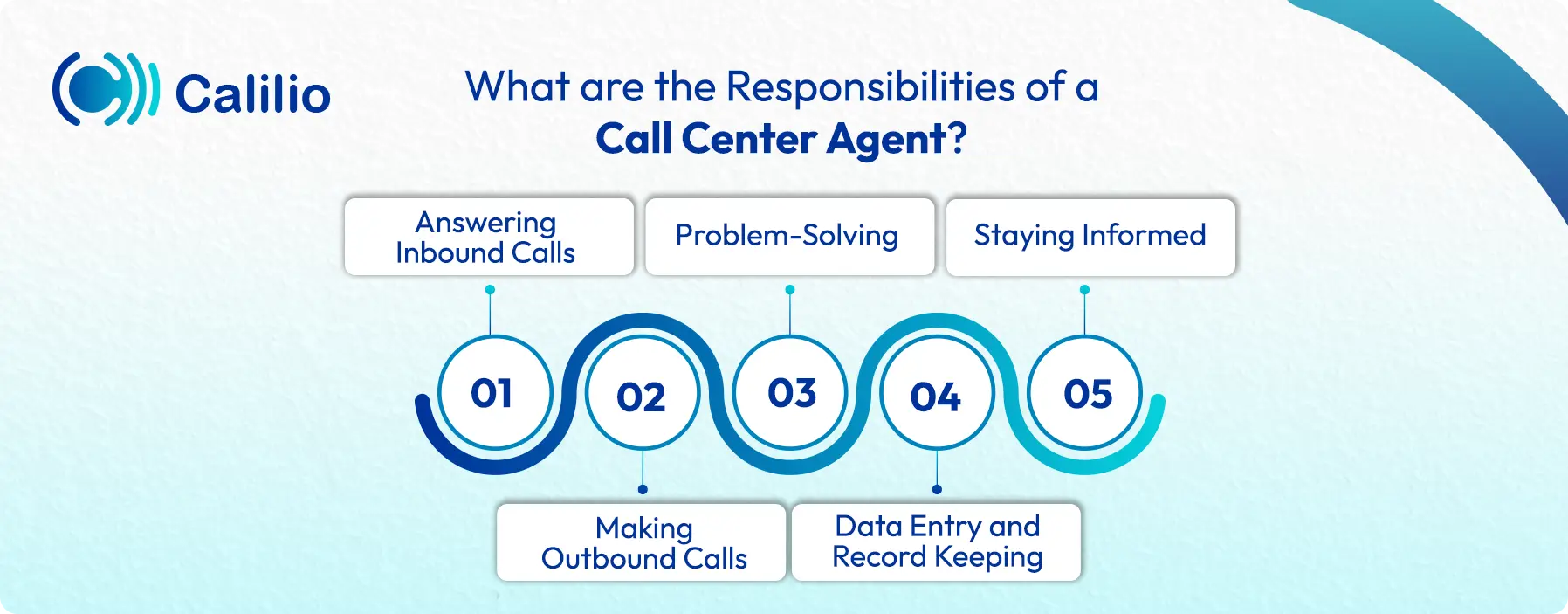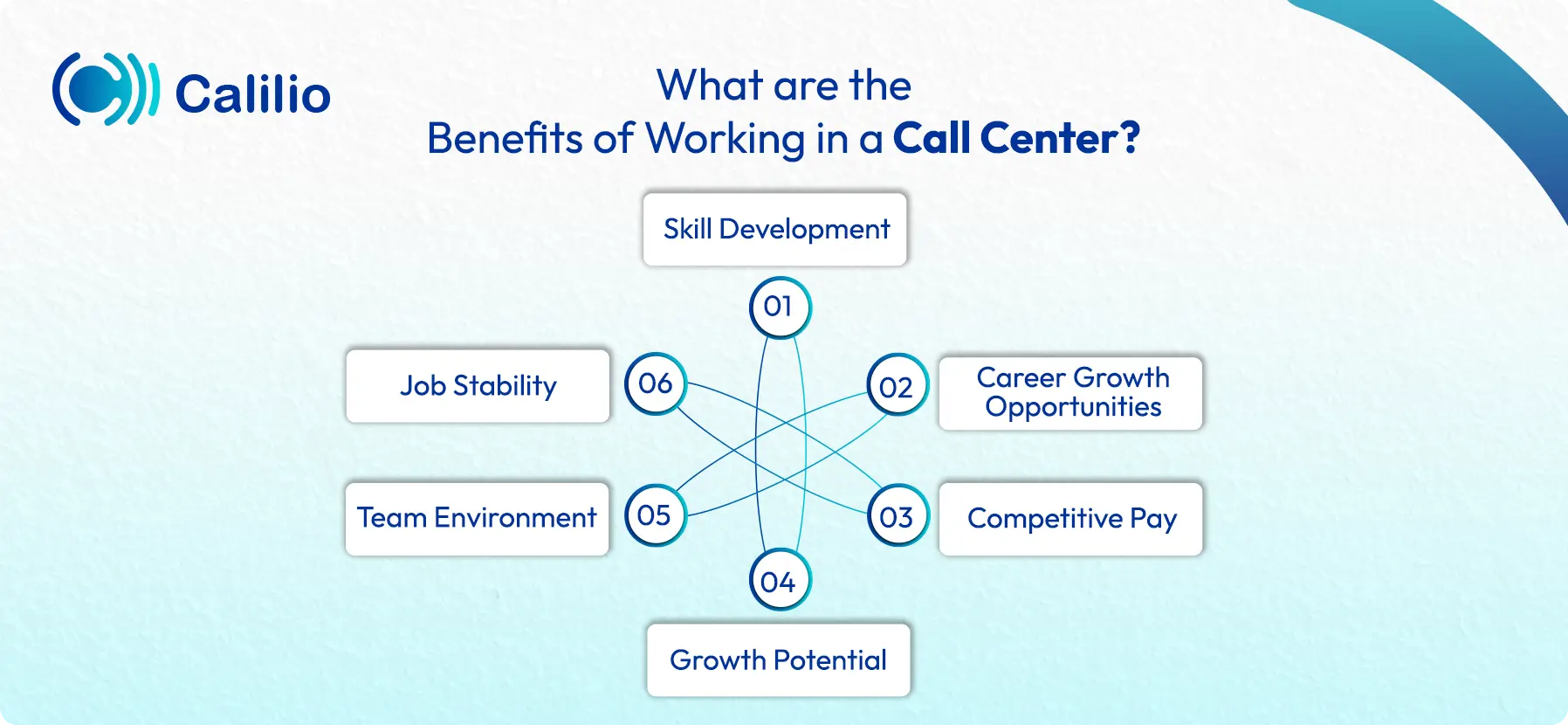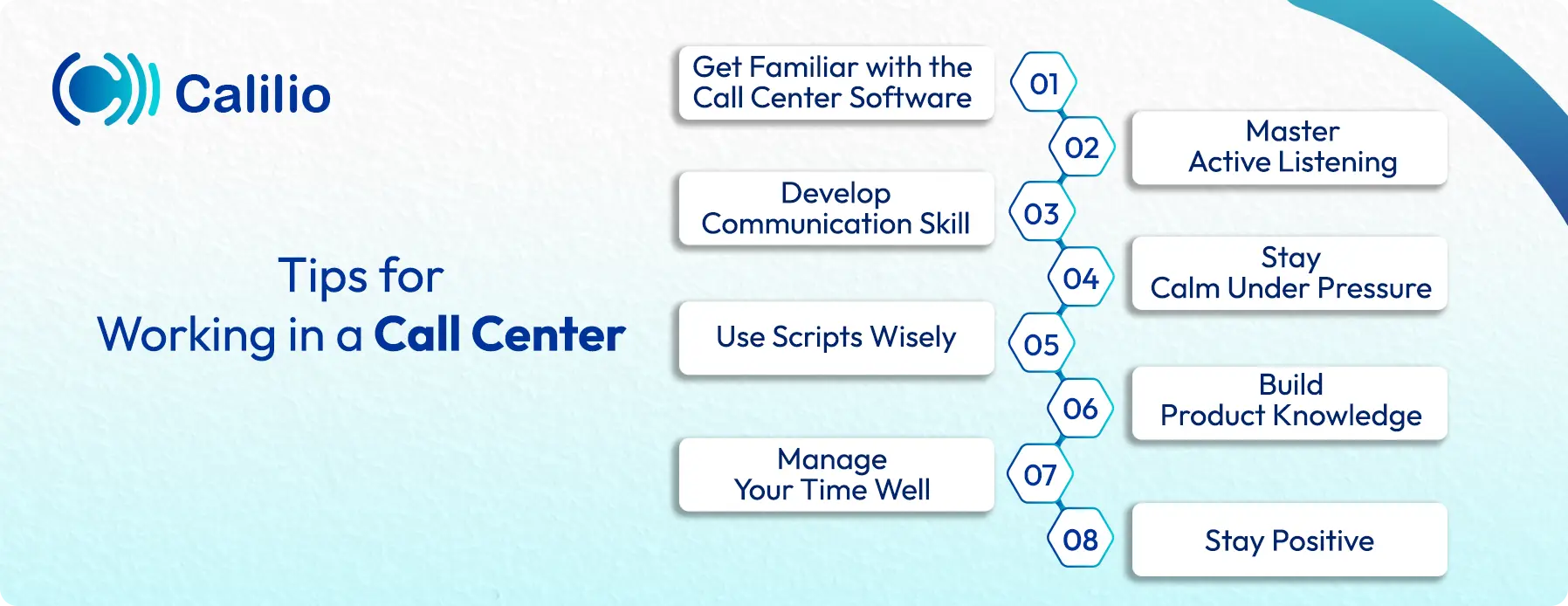What It’s Like Working in a Call Center: Roles, Skills & Tips

Working in a call center is not just about answering calls; it’s about being the voice of a company. Every interaction is a chance to solve problems, guide customers, and leave a lasting impression. However, the job can be demanding, with constant calls, strict targets, and pressure to deliver fast solutions.
But don’t worry. With the right preparation, a clear understanding of the role, and a positive mindset, you can handle the challenges confidently and turn them into opportunities for growth.
In this guide, we will explore what it is like to work in a call center, the roles and responsibilities involved, the benefits and challenges, and essential tips for success.
Key Highlights
Call center jobs come with defined roles and responsibilities. From agents to managers, each role is focused on providing excellent customer service while ensuring operational efficiency.
The common requirements for a call center job include strong communication skills, empathy, effective problem-solving abilities, multitasking, adaptability to changing situations, and managing stress.
Benefits of working in a call center include strong career growth opportunities, skill development, stable income, and long-term job opportunities.
The call center job has challenges like high workloads, strict targets, irregular shifts, and difficult customers.
What are the Responsibilities of a Call Center Agent?
The responsibilities of a call center agent include handling inbound and outbound calls, resolving customer problems, and escalating issues when needed. They also record call details, follow up with customers, and keep up with new policies and product updates.

- Answering Inbound Calls: Call center agents take calls from customers and respond to questions or concerns about products, services, billing, or technical issues.
- Making Outbound Calls: Reps sometimes call customers to follow up or give information. These calls can be for reminders, feedback, or special offers.
- Problem-Solving: Agents are expected to listen carefully to customer issues and work to find a practical solution. If they can’t, they forward it to someone who can.
- Data Entry and Record Keeping: After each call, agents record call details, update customer information, and log call outcomes in the system. This helps keep track of the customer’s history.
- Staying Informed: Agents need to stay up to date with product updates, policy changes, and system upgrades. This helps them give customers accurate and timely information.
Here’s a table of call center job descriptions with employee position and their roles:
Job Level | Role |
| Call Center Agent/Representative | Handles customer calls directly, like answering questions, resolving issues, and providing support or information. |
| Technical Support Agent | Assists customers with troubleshooting and solving technical problems related to products or services. |
| Sales Representative | Focuses on outbound calls to generate leads, promote services, and close sales. |
| Team Leader/Supervisor | Oversees a group of agents, monitors call quality, manages schedules, and provides coaching or feedback. |
| Quality Assurance (QA) Specialist | Reviews recorded or live calls to ensure compliance with company standards and customer service quality. |
| Trainer | Provides training sessions to new hires and existing agents to enhance communication, deepen product knowledge, and improve proficiency in using call center software. |
| Call Center Manager | Manages overall call center operations, sets performance goals, and implements strategies for efficiency and customer satisfaction. |
| Operations Manager/Director | Oversees multiple teams or departments, manages budgets, and aligns call center operations with business objectives. |
What are the Skills Needed to Work in a Call Center?
To work in a call center, agents need strong communication skills, empathy, patience, problem-solving ability, multitasking, and time management skills. They should also have technical knowledge, adaptability, and the ability to work well in a team to deliver effective customer support.
I. Strong Communication Skills
Clear communication is the foundation of customer service. Agents must speak confidently, listen actively, and explain solutions in simple terms. Good communication reduces misunderstandings and helps build trust with customers.
II. Empathy and Patience
Customers often call when they are frustrated or confused. An empathetic agent can understand their feelings, show patience, and provide support without rushing the conversation. This creates a positive customer experience, even when the problem is complex.
III. Problem-Solving Ability
Call center work is about finding solutions quickly. Representatives should be able to analyze issues, think critically, and resolve them in a way that satisfies the customer. Effective problem-solving also reduces the need for multiple follow-ups and transfers.
IV. Multitasking
A call center agent often juggles several tasks at once, like talking to customers, checking details in the CRM system, and updating notes. Strong multitasking ensures efficiency without sacrificing accuracy or customer experience.
V. Technical Knowledge
Since most call centers operate on VoIP and CRM platforms, agents must be comfortable using computers, headsets, and call management tools. Basic technical knowledge helps them navigate systems smoothly and resolve issues faster.
VI. Time Management
Call centers often set targets for average handling time and resolution speed. Agents must learn to balance efficiency with quality by keeping calls short while ensuring customer satisfaction. Good time management also prevents long queues and improves service quality.
VII. Teamwork
Although agents spend most of their time on calls, teamwork remains essential. Collaborating with supervisors and colleagues helps solve complex cases faster and keeps call center operations running smoothly.
VIII. Adaptability
Call center environments change quickly, with new policies, updated scripts, and varying customer personalities. Adaptable agents can adjust without stress and maintain consistent service quality.
What are the Benefits of Working in a Call Center?
Working in a call center helps employees build key skills while providing clear paths for promotion into leadership or specialized roles. The job also comes with a steady income, bonuses, and long-term employment stability.

- Skill Development: Agents build useful skills like communication, problem-solving, time management, and teamwork that can help in almost any career.
- Career Growth Opportunities: Many companies promote agents to higher roles like team leader, supervisor, manager, or into areas such as quality, training, or operations.
- Competitive Pay: Call center representatives usually get steady pay, performance bonuses, and benefits like healthcare and paid leave, making the job financially stable.
- Growth Potential: Many supervisors, managers, and trainers begin as agents, and with good performance, you can grow into higher roles within a few years.
- Team Environment: Working in a call center creates a sense of community. Reps often work closely with teams, making it easier to learn, collaborate, and support one another.
- Job Stability: Customer service remains essential for every business. This demand ensures that call center jobs continue to provide steady employment opportunities.
What are the Challenges of Working in the Call Center?
Working in a call center has disadvantages, like heavy call volumes, strict targets, and irregular shifts. Agents may also face repetitive tasks and difficult customers, which can lead to stress or burnout.
- High Workload: Agents often handle dozens of calls every day. Managing large call volumes while keeping each interaction professional can be tiring.
- Strict Targets: Call centers measure performance using metrics like average handling time, resolution rate, or sales numbers. Meeting these targets consistently can feel stressful.
- Difficult Customers: Not every call is pleasant. Some customers may be angry or impatient, and agents must remain calm and professional at all times.
- Irregular Hours: Working in a call center that handles global customers often requires night, weekend, or holiday shifts, which can strain employees’ work-life balance.
- Repetition and Burnout: Handling the same type of queries repeatedly may feel monotonous, and over time, it can lead to call center burnout.
- Pressure to Perform: The fast-paced environment requires agents to think quickly and deliver solutions without delay. This constant pressure can be mentally exhausting.
Essential Call Center Tools to Learn Before Working in a Call Center
Before working in a call center, it’s important to know tools, such as IVR, call routing, call recording, CRM integration, and AI reports. These tools reduce manual work, improve efficiency, and help agents focus on providing better customer service.
- Interactive Voice Response (IVR): IVR guides callers through menu options and connects them to the right department. It saves agents time by reducing unnecessary transfers and misrouted calls.
- Call Routing: Call routing automatically connects customers with the most suitable or available agent. It balances the workload and improves customer experience.
- Call Recording: Call center records phone calls for training or quality checks. This tool helps review how agents handle calls.
- CRM Software: A CRM system keeps customer information and history in one place. It guides agents by providing essential information, like the caller’s name, contact details, and previous interactions.
- Workforce Management (WFM) Tools: These WFM tools manage work schedules and track attendance. You’ll often use them to log in, log out, or request time off.
- Call Analytics and Reporting Tools: They track things like call length, wait times, and customer satisfaction. Supervisors use them to measure performance.
Stay Productive, Manage Calls Better, and Deliver Excellent Customer Experiences with Calilio’s All-in-One Call Center Solution
Tips for Working in a Call Center
To perform well in a call center, it’s important to learn how to use the tools effectively, stay patient under pressure, and speak naturally while using scripts. Also, good product knowledge and time management skills can enhance your efficiency and lead to a better customer experience.

1. Get Familiar with the Call Center Software
Before you can do your job well, you need to know how to use the tools you’re given. So, spend time to understand how to navigate the system interface, log calls, transfer customers, or pull up past interactions. The better you know the software, the smoother your calls will go.
2. Master Active Listening
Active listening means giving customers your full attention, not just hearing words but understanding their concerns. It helps you identify the real issue faster and avoid unnecessary repetition. When customers feel heard, they are more likely to trust your solution.
3. Develop Communication Skill
Call center jobs revolve around constant customer interaction. To succeed, you must speak clearly, listen attentively, and explain solutions in simple, easy-to-understand words. Strong communication not only solves problems faster but also leaves a positive impression.
4. Stay Calm Under Pressure
Not all customers will be polite or patient, but your calm tone can diffuse tension. Remaining composed allows you to think clearly and provide better support. This approach also shows professionalism, even in difficult situations.
5. Use Scripts Wisely
Scripts are designed to guide conversations, but reading them word for word can sound robotic. Instead, use them as a framework and add a personal touch to make interactions feel genuine. This balance keeps calls efficient while making customers feel valued.
6. Build Product Knowledge
The more you know about your company’s products or services, the easier it becomes to answer questions confidently. Customers notice when agents are knowledgeable and trust their guidance. Strong product knowledge also reduces call times and boosts customer satisfaction.
7. Manage Your Time Well
It’s important to be helpful, but you also need to keep calls efficient. Call center software often includes time tracking per call, which can help you see where you’re spending too much time. Use that data to adjust your approach without cutting corners.
8. Stay Positive
A positive mindset makes long hours and tough calls easier to handle. It helps you remain patient with customers and keeps your energy up during busy shifts.
Positivity is contagious. Maintaining an optimistic outlook can also motivate your teammates.
Conclusion
Working in a call center can be both challenging and rewarding. While it requires strong communication, patience, problem-solving, and the ability to stay calm under pressure, it also offers excellent career growth opportunities, skill development, and long-term stability. With the right mindset and preparation, you can turn the challenges into opportunities and build a solid career in customer service.
Summarize this blog with:
Frequently Asked Questions
How much do call center reps make?
Call center representatives typically earn between $25,000 and $45,000 per year in the United States, with variations depending on location, company, and experience. Many also receive bonuses, overtime pay, and benefits, which can increase their overall earnings.
Is working in a call center hard?
What tools or software do call center agents use?

Still have questions?
Can’t find the answer you’re looking for? Please chat with our friendly team.
Stay in the loop
Get the latest call insights, trends, and updates delivered straight to your inbox.
By subscribing, you agree to receive updates from Calilio.
You can unsubscribe anytime.
